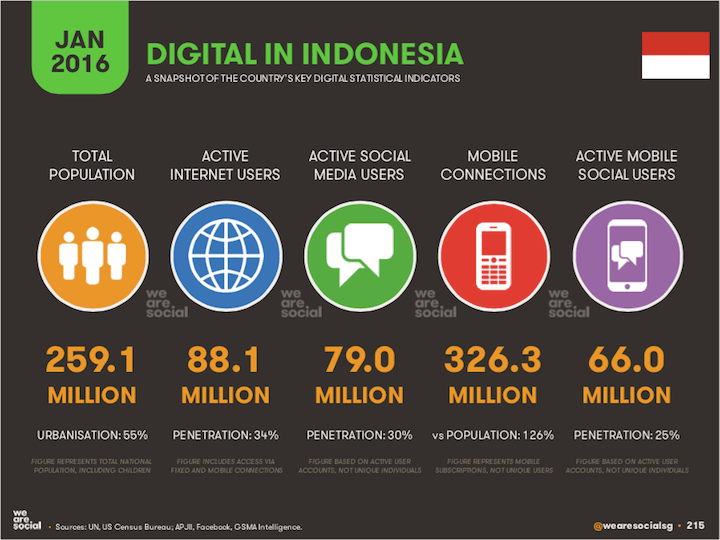Market Conditions Proving Favourable for Cryptocurrency Disruption in Indonesia
326.3 million SIM subscriptions, 57% smartphone ownership, 88.1 million internet users, lack of national credit lending systems, all conditions ripe for a cryptocurrency disruption in the country

WeAreSocial’s 2016 Digital Review of internet and mobile penetration in Indonesia
By the numbers, Indonesia is home to over 250 million, making it the largest, most attractive market in Southeast Asia and globally, the fourth largest market after China, India and the US. According to We Are Social’s Digital in Review 2016, Indonesia has been a marketplace that has been booming with SIM card sign-ups – 326.3 million subscriptions to be precise or almost an average of two SIM cards per mobile phone user. With 43% smartphone ownership and an projected growth to 57% by end 2017, the Indonesian population of 88.1 million active internet is ripe for bitcoin adoption.
In the Asian Development Bank’s “Financial Inclusion in Asia” report, it was reported that 78% of the Indonesian population or approximately 199 million people — are considered unbanked, making Indonesia one of the largest unbanked countries in Asia. As a result, this largely cash-based developing economy is poised for a digital financial disruption like the ones offered by cryptocurrencies and virtual currencies like Bitcoin. In fact, these market conditions have been ripe for start-up firms like Pundi Pundi, and now cryptocurrency spin-off Pundi X to serve the underserved market of those without access to traditional banking services.
Market Conditions Proving Favourable for Cryptocurrency Disruption in Indonesia
A company like Pundi X providing retailers, merchants and f&b outlets with payment gateways to accept digital currencies like Bitcoin and now, Aditus Tokens, is advantageous for the unbanked because it doesn’t require them to have a bank account. Champions of cryptocurrencies and blockchain advocate these virtual currencies because these distributed ledger technologies offer an alternative form of auditable but anonymised money remittance and transfer with far greater security and much lower fees. Coupled with the lack of a national credit lending system in Indonesia, increasing SIM, internet and smartphone penetration, are the perfect confluence of market ingredients which make cryptocurrencies such an attractive proposition.

A Pundi X merchant terminal accepting cryptocurrencies
According to Oscar Darmawan, CEO of Bitcoin Indonesia, , one of the country’s biggest exchanges, controlling over 70% of bitcoin transactions in the country, he has seen tenfold growth from 50,000 users in 2015 to over 500,000 in by the third quarter of 2017. Darmawan considers the daily transaction values of over $10 million a day to be a small figure, given that he believes market penetration for cryptocurrencies to be less than 1% of the total Indonesian population.
Cautious cryptocurrency investments in Indonesia
“On paper, Indonesia is one of the regions that is well poised to leverage blockchain technology. But I still haven’t seen a reason to visit Indonesia, and that definitely makes me think about why we haven’t seen top innovation.” – Siddharth Sthalekar, CEO of Sacred Capital to Forbes
That said, not all are bullish on the country’s cryptocurrency growth potential – global investors are still cautious about prospects in the country because so few major crypto-players have emerged comparative to Singapore, which has been a hotbed of cryptocurrency and blockchain based start-ups.
Speaking to Forbes, Siddharth Sthalekar, founder and CEO of Sacred Capital, a firm which evaluates and rates blockchain companies and Initial Coin Offerings (ICOs) said, “On paper, Indonesia is one of the regions that is well poised to leverage blockchain technology. But I still haven’t seen a reason to visit Indonesia, and that definitely makes me think about why we haven’t seen top innovation. This just isn’t a priority for regulators on their end. Blockchain technology may not be top of the mind in Indonesia—whereas in jurisdictions like Singapore it is.”
Overall, the immense numbers of the unbanked are largely the reason for the resulting fintech boom with companies like Go-Jek and Pundi Pundi but over all, demand for bitcoin wallets remain soft. In February 2017, Cointelegraph reported over US$ 260 million worth of bitcoin transactions per day or or $180,000 per minute. Furthermore, Bitcoin users move 1.7 million coins daily or US$1.8 billion (using then conversion rates), making it equivalent to 45 tonnes of gold per day. With those sort of transaction, it’s easy to see why Indonesia’s $10 million a day barely registers as “volume” for crypto-veterans.
That said, a compounding issue is that bitcoin has a store of value or remittance is still not clearly understood and too technical for the average consumer to understand. However, as start-ups like Pundi Pundi make cashless QR payments a daily fixture, the logical gap in going from cashless digital payment to using cashless digital currency for payment is not that big a leap, especially since the new Pundi- X spin off is expected to allow anyone, even those without traditional bank accounts to hold, buy and sell cryptocurrencies in physical stores with a smartphone and then use these cryptocurrencies in over 600 stores in Jakarta.
While countries like Singapore have no plans to regulate cryptocurrency, Indonesia’s central bank has refused to legally recognise bitcoin transactions. However, the stringent regulations provided by Bank of Indonesia are so poorly defined that the nature of cryptocurrency as either currency or commodity remains murky at best; as a result, regulatory authorities find enforcement of these regulations difficult.









